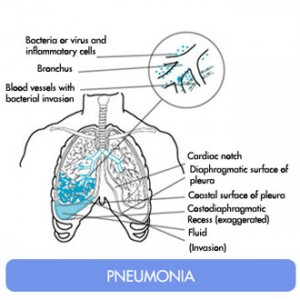Lately, it has been raining in different parts of Nigeria — erratic bouts of downpour in the middle of what is supposed to be the harmattan season. You would not catch me complaining though. It has been a while since I experienced harmattan, and I had forgotten just how hot and dusty it could get. Needless to say, at the first whiff of breeze, I was throwing open all my windows and carrying my novel to camp out in the balcony. Can I hear an amen for fresh, crisp air? Only for me to get to the door and find my mother locking it. “Ah, you want to go outside? No please, it’s too cold. You’d catch pneumonia.”
I have to wonder. Where did we all get this common misconception that cold causes pneumonia? I say ‘we’ because I was once guilty of this ignorance, until, (un) fortunately for me, I blurted out the blunder to the hearing of one my biology professors. She corrected me but not until I had felt properly ashamed.
To save you the embarrassment, I have compiled a few facts about pneumonia to aid in the proper comprehension of the ailment.
- Pneumonia is a lung infection that can be caused by different types of micro-organisms, including bacteria, viruses, and fungi. You see, the lungs are made up of small (microscopic) sacs called alveoli, which fill with air when a healthy person breathes. When an individual has pneumonia, the alveoli are filled with pus and fluid instead, which makes breathing painful and limits oxygen intake.
- The only way cold relates to pneumonia is that during such harsh weathers, the cold puts a high amount of stress on your body (for reasons including to muscle tension and cortisol release), thereby reducing the efficiency of your immune system, especially if you are sick or old. With your immune system down, you are therefore exposed to disease causing organisms.
- The symptoms of pneumonia include cough with sputum production (mucus), fever, and sharp chest pain on inspiration (breathing in)
- Doctors often confuse pneumonia for bronchitis. Indeed, they are very similar ailments; only causal difference is that in bronchitis, the bronchi is affected, not the alveoli. In pneumonia, because the pus, pleural effusion ensues. Pleural effusion is when there is excess fluid between the chest (ribcage) and the lungs, thereby affecting breathing due to pressure. So, as a patient, you could insist on an x-ray to ensure you are been treated for the right disease.
- Only bacterial and fungal pneumonia are curable. They can be treated with antibiotics. Viral pneumonia is only preventable, as there are vaccines for it. Unlike bronchitis that goes away after at least three weeks even without medication, pneumonia most times require hospitalization.
All this notwithstanding, we do have to respect our mothers. Wrap it up, at least you would not feel the chill.



